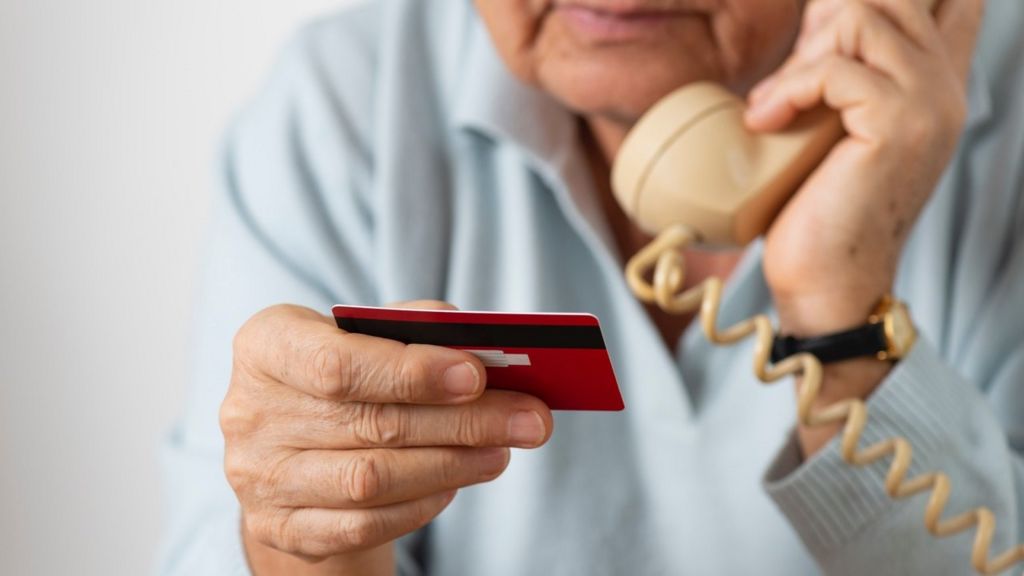 Abraham Lincoln
If given the truth, the people can be depended upon to meet any national crisis...
Abraham Lincoln
If given the truth, the people can be depended upon to meet any national crisis...
 Guildford news...
for Guildford people, brought to you by Guildford reporters - Guildford's own news service
Guildford news...
for Guildford people, brought to you by Guildford reporters - Guildford's own news service
Surrey Police Says Protect Your Loved Ones from the New Tactics of Courier Fraudsters
Published on: 16 May, 2022
Updated on: 16 May, 2022
Surrey Police are urging carers, family and friends of vulnerable people to be on their guard to help prevent their loved ones being exploited by fraudsters after a 37% increase in courier fraud in the last 12 months and a continued rise in 2022.
The warning comes as a new list of tactics used by courier fraudsters has been unveiled by the City of London Police.
 Typically, courier fraudsters target their victims by claiming to be a police officer or a member of staff from a victim’s bank and they often pressure people into making quick financial decisions to assist with fictitious investigations.
Typically, courier fraudsters target their victims by claiming to be a police officer or a member of staff from a victim’s bank and they often pressure people into making quick financial decisions to assist with fictitious investigations.
See: Surrey’s Phone Frauds: A Guildford Victim Tells His Story
In 2021 alone, 480 people were victims of courier fraud, with loses totalling more than £2 million and in the same year Surrey Police were contacted 49 times by banks regarding courier/impersonator fraud crime. Thankfully those calls and the swift action of the banks involved resulted in preventing over £250,000 from being handed over to fraudsters.
Between January and April 2022, there have already been 191 reports of courier fraud made to Surrey Police, with a total loss of nearly £1.5 million. Surrey Police have already been contacted 17 times by banks preventing £58,000 being handed over to fraudsters.
An analysis of data from the National Fraud Intelligence Bureau (NFIB) has highlighted four modus operandi (MOs) which are now more commonly being used by fraudsters.
Four common methods used by courier fraudsters:
- Bank card expiry: Fraudsters claim to be from the victim’s bank and say their card is no longer valid. They ask for the pin number and then send a “courier” to collect the card before using it for fraudulent purposes.
- Purchasing high-end items: The suspects pretend to be police officers and ask the victim to help with an undercover operation by purchasing expensive items like watches, jewellery, and gold. Once the item is bought, the victim will hand it over to the criminal.
- Counterfeit cash/bank investigation: A person claiming to be a police or banking official informs the victim that they need to help with a banking corruption investigation. The victim is told to withdraw a large amount of money and the cash is picked up later by a courier to “check for fingerprints or to identify counterfeit banknotes”.
- Computer takeover: The fraudster telephones the victim, purporting to be from their internet service provider, saying that they have had an issue with their internet connectivity, and they are due compensation. The victim is persuaded to download a remote access application, giving the suspects access to their home computers. The fraudster persuades the victims into thinking that they have been paid too much compensation and the victims then withdraw cash to pay the money back, which is later collected by a courier.
 PC Bernadette Lawrie, Financial Abuse Safeguarding Officer for Surrey Police and Sussex Police said: “Behind all of the clever tricks and ever-changing narratives, there are a few basic recurring elements that are common across many frauds, including courier fraud.
PC Bernadette Lawrie, Financial Abuse Safeguarding Officer for Surrey Police and Sussex Police said: “Behind all of the clever tricks and ever-changing narratives, there are a few basic recurring elements that are common across many frauds, including courier fraud.
“It pays to stop and think anytime you receive a request for personal or financial information. Remember, if you feel uncomfortable or unsure about what you’re being asked to do, contact your bank or financial service provider directly, using a number you trust, such as the one listed on your bank statements or on the back of your card.
“Alternatively, check your actions with a trusted friend or family member.”
Signs of courier fraud:
- Courier fraud usually starts with an unsolicited telephone call to the victim.
- Typically the suspect will pose as a bank official, police officer or a computer or utility engineer.
- Courier fraudsters will usually request the victim to purchase high-value items such as Rolex watches and gold bullion, withdraws cash or provides a bank card for collection from a courier.
- Fraudsters will instruct victims not to tell any family or friends about what they are doing.
- When carrying out courier fraud, criminals will request the victim hangs up the phone to ring their bank for confirmation while keeping the line open. The suspect then purports to be a bank official and provides false confirmation.
- Fraudsters will also make arrangements for a courier to meet the victim to collect the item they have purchased.
 Anyone who receives an unexpected call from someone claiming to be one of these officials should verify they are speaking to someone genuine: hang up, wait five minutes and call back on a number they know is genuine.
Anyone who receives an unexpected call from someone claiming to be one of these officials should verify they are speaking to someone genuine: hang up, wait five minutes and call back on a number they know is genuine.
A number of support services have been created to help combat nuisance calls, including the trueCall system. The device acts like a home receptionist and lets calls from friends and family straight through, but unrecognised callers are required to identify themselves before the call is put through and unwelcome callers are blocked.
Steve Smith, Director of trueCall, said: “Older and vulnerable people really do need protection – particularly those who live alone and those who have been scammed already. It is this demographic that is being specifically targeted by telephone scammers, receiving 20 to 40 per cent more unwanted calls than the rest of the population.”
City of London Police would urge anyone who is contacted by someone they do not know, or cannot verify the identity of, to follow the Take Five To Stop Fraud advice.
Take Five to Stop Fraud advice
- Stop: Taking a moment to stop and think before parting with your money or information could keep you safe.
- Challenge: Could it be fake? It’s okay to reject, refuse or ignore any requests. Only criminals will try to rush or panic you.
- Protect: If you think you’ve been a victim of fraud, contact your bank immediately and report it to Action Fraud online.
A police spokesperson said: “If you or someone you know is vulnerable and has been a victim of fraud call:
- Surrey Police on 101 or visit www.surrey.police.uk
- Report fraud or attempted fraud, by contacting Action fraud at;
- http://www.actionfraud.police.
uk/report_fraud or call 0300 123 2040.”
Recent Articles
- Guildford Institute’s Crowdfunding Project for Accessible Toilet in its New Community and Wellbeing Centre
- Letter: Guildford – Another Opportunity Missed?
- Letter: GBC’s Corporate Strategy – Where Is the Ambition?
- My Memories of John Mayall at a Ground-breaking Gig in Guildford Nearly Six Decades Ago
- Westborough HMO Plans ‘Losing the Heart of the Street’ Says Resident
- College Invests to Boost Surrey’s Economy and Close Digital Skills Gap
- Community Lottery Brings Big Wins for Local Charities
- GBC Housing Plan Promises ‘A Vibrant Urban Neighbourhood’ Near Town Centre
- Hospital Pillows ‘Shortage’ at the Royal Surrey
- Updated: Caravans Set Up Camp at Ash Manor School


Search in Site
Media Gallery
Dragon Interview: Local Artist Leaves Her Mark At One of England’s Most Historic Buildings
January 21, 2023 / No Comment / Read MoreDragon Interview: Lib Dem Planning Chair: ‘Current Policy Doesn’t Work for Local People’
January 19, 2023 / No Comment / Read MoreA3 Tunnel in Guildford ‘Necessary’ for New Homes, Says Guildford’s MP
January 10, 2023 / No Comment / Read More‘Madness’ for London Road Scheme to Go Ahead Against ‘Huge Opposition’, Says SCC Leader
January 6, 2023 / No Comment / Read MoreCouncillor’s Son Starts Campaign for More Consultation on North Street Plan
December 30, 2022 / No Comment / Read MoreCounty Council Climbs Down Over London Road Works – Further ‘Engagement’ Period Announced
December 14, 2022 / No Comment / Read MoreDragon Interview: GBC Reaction to the Government’s Expected Decision to Relax Housing Targets
December 7, 2022 / No Comment / Read MoreHow Can Our Town Centre Businesses Recover? Watch the Shop Front Debate
May 18, 2020 / No Comment / Read More










Recent Comments